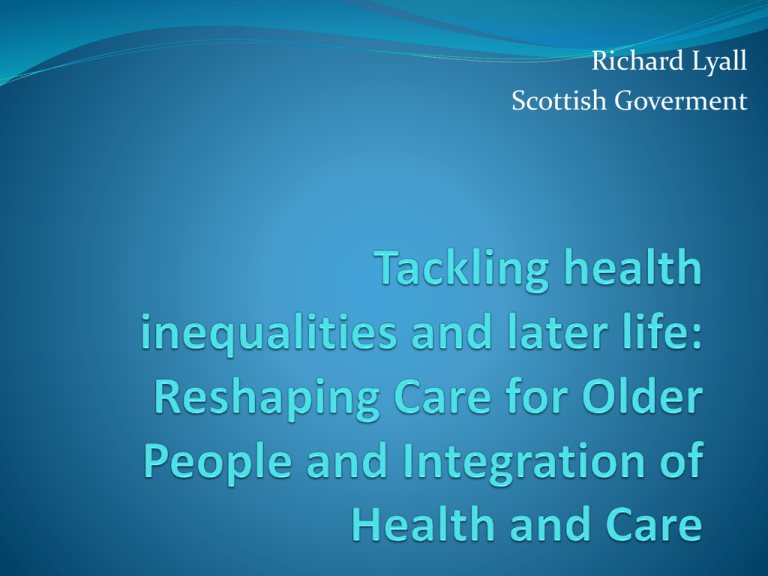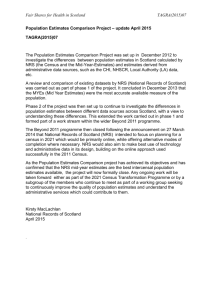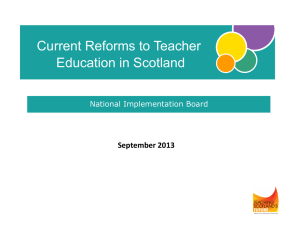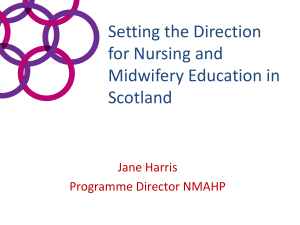Richard Lyall - Voluntary Health Scotland
advertisement

Richard Lyall Scottish Goverment Care for older people has been changing… Scottish Government, Local Authorities and local health boards have made changes over time to adapt – with third sector involvement Services have improved and evidence of innovative ideas making a difference Regulations and standards are tighter and processes have improved Always room for improvement and working together better! Impetus 65+ and 90+ population expected to be much bigger in 20 years Christie Commission for the Future Delivery of Public Services Remit to consider models of service delivery in public sector against increasing demand and resource constraint Key Points from Christie Report Involve individuals and communities who use public services in their design and delivery. Have a ‘joined up’ approach to delivering services, to reduce duplication and save money. Spend money to prevent problems and inequalities over the longer term, rather than spending money on solutions = PREVENTION better than a cure Improve efficiency to get more value for money. The shape of our population in 20 years… The projected percentage change in age structure of Scotland's population, 2010-2035 2012 2022 5.3 Million 5.5 Million 2032 5.7 Million By 2032: 1 in 4 will be 65+ 94,000 will be 90+ Source: NRS On current trends, it’s possible that deaths >85 will overtake those <85 in 2014 Source: NRS: Deaths by Age Group, 1901-2012 Source: NRS: Combination of Census Results and Mid Year Population Estimates ♀ 80.9 yrs ♂ 76.9 yrs ♀ 62.0 yrs ♂ 59.4 yrs Source: Scotland Performs Source: Scottish What drives demand for Health & Social care in Scotland? Population Health Behaviours Supply Source: As previous slide + ISD SMR01 (Admissions), A&E Data Mart & Ambulance MI Source: As previous slide + NRS Population Projections (2012 Based) to 2037 Other Age-Linked Health Demands ↑ 46% of Population with LTC in 2012, ↑ from 41% in 2008 Source: SHeS (LTC) Source: ISD QOF Dementia ← 50,000 Consultation s in 2012/13, ↑ from 30,000 in 2006/07 (GP/GN) Source: MM (Lancet Paper) • 1 in 10 are lonely • Increased likelihood of engaging in unhealthy behaviours • More likely to use services Source: Victor, 2011 Age UK, 2010 Reshaping Care for Older People: …. moving away from 'institutional' care towards care in the home or a homely setting that is designed around the needs of the individual Source: Community Care Quarterly Monitoring Return, ISD(S) 1 Source: Source: ISD Scotland [Form ISD(S)1] Behaviours and their Impact on Demand for Health Services 26% of adults are in ‘not good’ health 36% smoke 20% smoke 63% failed to meet the physical activity recommendation 39% are obese 29% failed to meet the physical activity recommendation 23% are obese 16% are hazardous or harmful drinkers Source: Scottish Health Survey, 2012 23% are hazardous or harmful drinkers 74% of adults are in ‘good’ health Impact of deprivation on health 90 85 82 80 73 69 70 60 50 40 30 26 23 20 12 12 10 0 Male Female Most Deprived Years in 'Not good' health Male Female Least Deprived Life Expectancy Source: Scottish Health Survey, Scottish Household Survey, National Records Scotland Reshaping Care for Older People In a nutshell: a move away from institutional care being the ‘default’ option Focus on the person, their tastes and preferences Money spent on preventing situations arising and conditions worsening, rather than being spent on care “after the event”. Wide ranging initiatives… Dementia Housing Volunteering Telecare Telehealth Residential Care Reablement Nutrition Palliative Care Handy Person Services Transport Carers Pharmaceuticals Digital Agenda Buddying Some good examples… Third Sector Interfaces – community engagement and capacity building Hospital at Home in North Lanarkshire - multi agency team - quick response to emergency to avoid admission - same service delivered at home as would be received in hospital. Anticipatory Care Plans in Aberdeen - 1500 ACPs developed between GPs and those deemed most at risk of emergency admission - fall in admissions and good anecdotal evidence What have we done? RCOP - 10 year programme to 2021 - Change Fund - Legislation - Strategies - Getting On Report - Measuring success Working together Early Success… - A reduction of 6.8% in the emergency admissions bed days rate for the over 75s - 55,000 people over 50 are benefitting from a new telecare and telehealth programme - £300 million of Change Fund monies distributed to Local Partnerships since 2011/12. Public Bodies (Joint Working) (Scotland) Act (2014) Principles for integrated health and social care Nationally agreed outcomes for health and wellbeing Integrated governance arrangements for health and social care: delegation to a body corporate or lead agency Integrated budgets for health and social care Integrated oversight of delivery Strategic planning Locality planning Timescales Consultation on Regulations and development of Guidance MAY– AUGUST 2014 Regulations and guidance complete NOVEMBER 2014 – FEB 2015 Integration goes live locally APRIL 2015 All integrated arrangements must be in place APRIL 2016 What should partnerships be doing now? Agreeing which model to use So far: 1 lead agency, 30 bodies corporate, 1 undecided Establishing strategic planning groups Consulting on and agreeing localities Starting work on the integration scheme and delegated budgets Key challenges Engaging clinicians, particularly GPs Agreeing delegated budgets What next? Outcomes approach Move to Integrating Care Fund in preparation for wider changes – focused on health inequalities, multimorbidities and not just older people Update on RCOP - 2016/17 including reflecting on mainstreaming of change Joint strategic commissioning From Personal to National Outcomes Outcome Level Focus Example Individual / Personal Defined by a person as what change/improvement is important to them in life I want to be able to get back to my walking group Service / Project Defined by a service as a key change to work towards with clients/users We work with older people to improve their ability to get out & about Organisational Defined by organisations as a The older people we work priority aim/goal to work towards with are more socially included/ connected (local authority, NHS board, 3rd sector) Local Partnership (CPP, H&SC) National Defined across organisations as a shared outcome to work towards Older people are able to maintain independent living for longer Defined by government as priorities for cross-govt activity We live longer, healthier lives Source: Talking Points: Personal Outcomes Approach, JIT June 2012 Physical health & function Mental health & wellbeing, staying positive and in control Independent living Healthy lifestyle, Keeping active, eating well Social environment Secure & supportive relationships Participation in community life Making a positive contribution Physical environment Housing, neighbourhood, Transport/mobility Feeling safe What Outcomes are valued? Financial/material security, Strategic outcomes model oooooo Key population groups PREVENTION - Keeping people healthy, active and independent for longer EARLY INTERVENTION - those whose health and independence is at risk /in transition TREATMENT AND CARE those with high support needs and their carers Good practice in outcomes-based JSC Requires the capacity to – Co-produce an outcomes framework with partners Change/re-design procurement processes so that effective services/actions are commissioned build the awareness and capacity of local providers to support and promote this approach. Most effective contributions A Stitch in Time? To explain the third sector's contribution to Reshaping Care for Older People Overview model Nested models – e.g. Day care in West Lothian, Community Transport in Edinburgh Case studies – e.g. Community Connecting (Edinburgh), Reducing social isolation for older people in Midlothian Literature reviews Indicator bank http://www.evaluationsupportscotland.org.uk/how-can-we-help/shared-learning-programmes/stitch-time/ Nested models Monitoring and evaluation Setting Outcomes Collecting information Evaluation Pathway Learning from your findings www.evaluationsupportscotland.org.uk Analysing and Reporting











